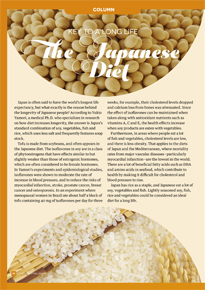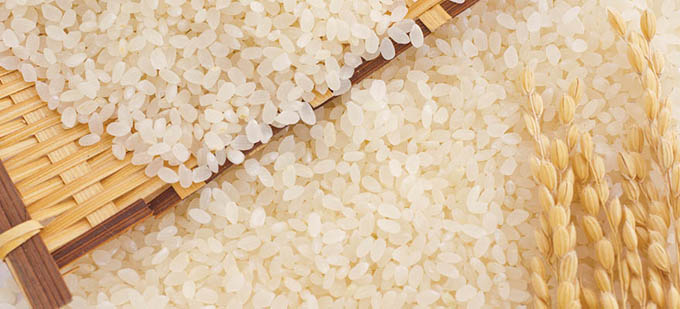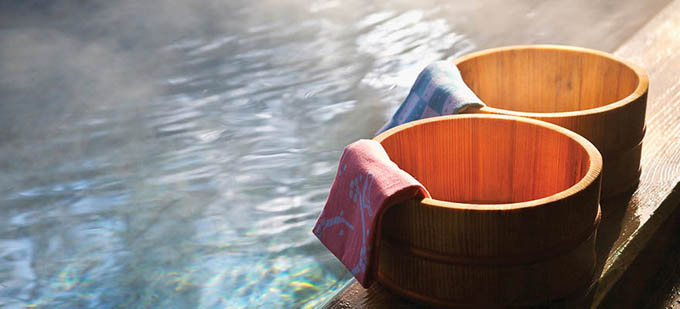Home > Highlighting JAPAN >Highlighting Japan November 2014>Healthcare in Japan
Highlighting JAPAN

COLUMN
Key to a Long Life
The Japanese Diet

Japan is often said to have the world’s longest life expectancy, but what exactly is the reason behind the longevity of Japanese people? According to Yukio Yamori, a medical Ph.D. who specializes in research on how diet increases longevity, the answer is Japan’s standard combination of soy, vegetables, fish and rice, which uses less salt and frequently features soup stock.
Tofu is made from soybeans, and often appears in the Japanese diet. The isoflavones in soy are in a class of phytoestrogens that have effects similar to but slightly weaker than those of estrogenic hormones, which are often considered to be female hormones. In Yamori’s experiments and epidemiological studies, isoflavones were shown to moderate the rate of increase in blood pressure, and to reduce the risks of myocardial infarction, stroke, prostate cancer, breast cancer and osteoporosis. In an experiment where menopausal women in Brazil ate about half a block of tofu containing 40 mg of isoflavones per day for three weeks, for example, their cholesterol levels dropped and calcium loss from bones was attenuated. Since the effect of isoflavones can be maintained when taken along with antioxidant nutrients such as vitamins A, C and E, the health effects increase when soy products are eaten with vegetables.
Furthermore, in areas where people eat a lot of fish and vegetables, cholesterol levels are low, and there is less obesity. That applies to the diets of Japan and the Mediterranean, where mortality rates from major vascular diseases—particularly myocardial infarction—are the lowest in the world. There are a lot of beneficial fatty acids such as DHA and amino acids in seafood, which contribute to health by making it difficult for cholesterol and blood pressure to rise.
Japan has rice as a staple, and Japanese eat a lot of soy, vegetables and fish. Lightly seasoned soy, fish, rice and vegetables could be considered an ideal diet for a long life.
One Secret of Japanese Longevity
A Hot Bath

Few people on Earth are as dedicated to soaking in hot water as the Japanese, who traditionally wash up outside the bath before they do so. Masaharu Maeda, a professor of rehabilitation studies at the International University of Health and Welfare Graduate School, believes this bathing culture—from the humble home bath to extensive onsen (hot springs) resorts—is one of the secrets to Japanese longevity.
Maeda says a hot bath is recognized as having a range of benefits. When exposed to a moderate external shock that changes its temperature, the human body defends itself by adjusting its core temperature. This activates natural killer cells—which are part of the immune response—and Hsp70 (heat shock proteins) that assist in cell repair are created. In other words, by raising body temperature, bathing improves heat retention and the immune response and stimulates protein repair.
Hot springs, which epitomize Japan’s bathing culture and are vastly popular, have been known since ancient times as a rehabilitative and preventive means of dealing with the dull pains associated with sore shoulders and lower back pain, among other conditions. Warming the body activates the parasympathetic nervous system, creating a relaxing effect that also helps with insomnia. The saunas popular in northern Europe also improve heat retention, but bathing in hot water offers an additional massaging effect from water pressure and various minerals with therapeutic effects.
If the aim is to simply keep the body clean, of course any form of bathing will do. However, no bathing regimen matches the Japanese approach in terms of health benefits, and experts are hoping that people in other regions can make this healthy bathing practice part of their lifestyles.
© 2009 Cabinet Office, Government of Japan






